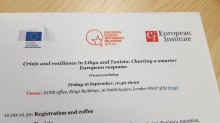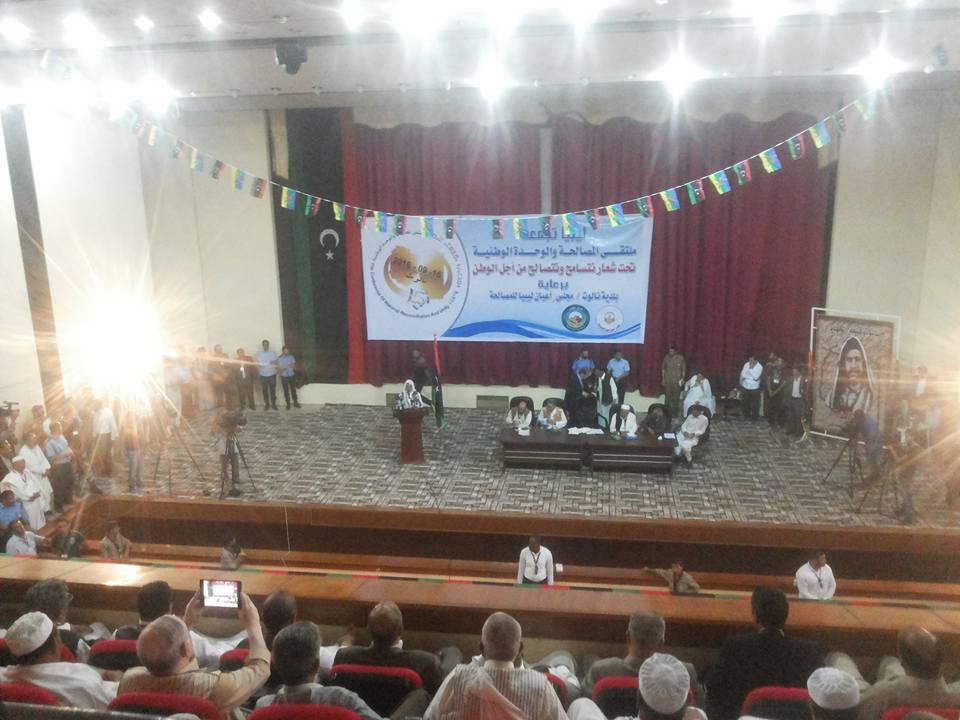By Sami Zaptia.

Tripoli, 17 September 2016:
A workshop was organized by the European Council on Foreign Relations (ECFR) in London yesterday under the title ‘‘Crisis and resilience in Libya and Tunisia: Charting a smarter European response’’.
Presentations were made by Mohamed Farhat, Libya’s ambassador to the EU, Otman Gajiji of the Central Committee of Libyan Municipal Elections, Claudia Gazzini, Libya Senior Analyst at the International Crisis Group and Mattia Toaldo, Senior Fellow at the ECFR.
About 50 Libyan and non-Libyan officials, academics, analysts, experts and Libya specialists attended the afternoon Libya session to discuss the development of the political process in Libya and problems connected with reconciliation, the economic crisis and the presence of jihadist groups.
Europe’s ability to deal with its most immediate priorities of terrorism and migration while supporting efforts at sustainable political unity were also debated.
With regards to Europe’s response, it was questioned whether the EU’s current policy framework was adequate and if a choice between stability and democratic reform had to be made by Europe.
On the military takeover of the eastern oil installations by Khalifa Hafter and his Libyan National Army (LNA) from local strongman and Petroleum Facilities Guard leader (PFG) Ibrahim Jadhran, Misrata’s Municipal Council’s announcement that it would not be taking any counter action was welcomed so long as they are able to influence all other factions within the city.
It was argued that Hafter’s oil crescent takeover was planned as early as May when he moved forces to Zellah south of the oilfields under the guise of maneuvering to attack ISIS in Sirte. The National Oil Corporation’s chairman, Mustafa Sanalla, was believed to have been on board with Hafter and the LNA in their oil crescent takeover.
It was felt that Ibrahim Jadhran’s open demands for a pay-off in return for allowing the resumption of oil exports had lost him the support of his tribe. Jadhran was undermined by the loss of his Magharba tribe and tribal leader in Ajdabiya, Salah Al-Atewish. The prominent role of the tribe in Libyan politics was noted.
Policy formulation by the international community, the EU and the Foreign and Commonwealth Office was criticized for failing to understand the dynamics on the ground in Libya and particularly in the east. The West’s vision of the east was tilted as a result of it being filtered by Tripoli, it was argued.
The West must accept the status quo on the ground in the east of Libya in order for the Libyan Political Agreement (LPA) and its Presidency Council/Government of National Accord (PC/GNA) to succeed, it was argued.
The UN’s inability to make contact and meet with Hafter and the east had disabled it, preventing it from better understanding the motivations and dynamics in the east, thus hindering the UN’s policy making ability.
The West’s overlooking of the House of Representatives and its assumption that the east of Libya would eventually come on board was deemed erroneous. Wrong assumptions and poor information about Libya and the east specifically by the international community created bad Western policy. Better contacts and information with the east are needed to feed better policy formulation.
The international community must seek real accord between the conflicting parties if it is indeed to be seen as an honest broker, promoting rapprochement and reconciliation and healing the large Libyan divides. Acting as an honest broker would also counter Libyan conspiracy theories of external agendas to split Libya, it was argued.
The international community was also criticized for having no exit strategy in the event of the failure of the LPA and its PC/GNA.
Both the main conflicting Libyan parties were receiving military support in one form or another since 2011 from Egypt, Qatar, Turkey, Sudan, UAE, Jordan, Italy, UK, USA and France, which was extending the Libyan conflict, it was argued.









